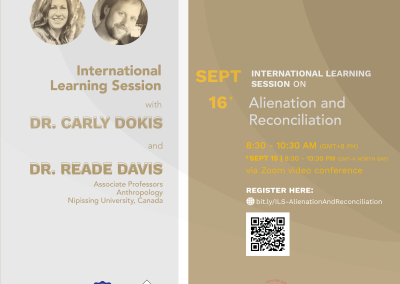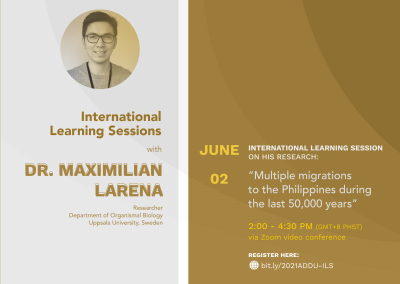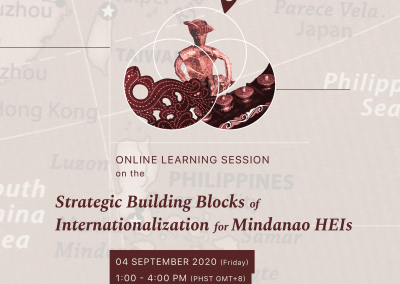International Learning Session
Ateneo de Davao University (ADDU) hosts regular visiting scholars who not only do research in Mindanao, but also serve as guest instructors in international learning sessions about various topics and areas of engagement. International learning sessions are usually comprehensive, presented as a meticulous yet engaging survey of a specific topic, championing the specializations of the guest speaker. The guest instructor proposes a topic for discussion, and chooses one or a combination of the various formats available to AIM’s International Learning Sessions, such as: the Pakighinabi (local term for dialogue) Sessions, Lecture Series, Bappa Benny’s International Talk Series, or the Alternative Class format for Undergraduate and Graduate Programs.
OBJECTIVES
Engage esteemed scholars and masters from various fields of study to share their knowledge and research in learning sessions.
Provide an avenue for dialogue among different departments, fields, and sectors from all over the world.
Maximize the opportunity for mutual global learning among scholars from different cultures and nationalities.
Program Overview
The topics of the International Learning Sessions are varied. Its themes may cover a discussion on the sciences and engineering, politics and philosophy, research and development, formation and spirituality, engagement and advocacy, etc. The sessions are available as one or a combination of the following formats: Pakighinabi Session, Lecture Series, Bappa Benny’s International Talk Series, or Alternative Class for Undergraduate and Graduate Programs.
Pakighinabi Session
The Pakighinabi (i.e. dialogue) is a local form of engagement in ADDU. It is designed as a less formal approach to learning as it is more communicative and social. The format focuses more on the discussion, breaking away from the restrictions of a formal lecture.
Pakighinabi sessions feature issues and topics from a wide range of key areas and disciplines. But more importantly it is open to students, faculty, and guests that represent the diversity of Mindanao, hailing from different cultures, faiths, and scholastic backgrounds.
The conversation begins with the lead discussant who introduces the main topic and the talking points. The lead discussant in this case is the guest speaker/visiting scholar. The participants are guided by the lead discussant into a forum where identified reactors then share their insights. After the reactors’ sharing, everyone is invited to raise points, exchange thoughts, and extend the conversation. After the discussions, there may be individual or group reflection sessions, or small groups for action planning, depending on the intended output or program design. Usually, the lead discussant is given 30 minutes to ground the discussion, the rest of the allotted time (usually 2 hours) will be saved for open dialogue with participants.
Lecture Series
The Lecture Series is a chain of talks that champion the guest instructor’s specialization as it is presented in different angles or discussed within a variety of subtopics that align as one thematic lecture series.
The format allows for a variety in discussion points that caters to different participants coming from different fields of research or course of study. The guest instructor, for instance, may propose a general topic of environmental preservation and thereby explore a multi-presentational approach across the lecture series that discusses environmental preservation in levels of business, theology, engineering, or even the arts.
This format also encourages exploration through multi-disciplinary conversations, and it opens up multiple levels of problem-solving. The post-discussion application of the lecture series carries so much potential for collaborative action.
After each lecture, a panel of reactors then present their opinions to get the ball rolling for discussion. The audience then can share their realizations and ask questions to the lecturer. Finally, the lecturer presents a synthesis of the discussion in light of the input from participants.
Bappa Benny’s International Talk Series
The Bappa Benny’s International Talk Series, is named after Bishop Tudtud (fondly called as “Bappa Benny”) of the Diocese of Iligan in Mindanao who pioneered the efforts of reconciliation and interreligious dialogue between Christians and Muslims. This talk series is designed as a listening session like the global TEDTalk Series that present compelling topics, or innovative arguments/perspectives that the audience has never heard about. This type of learning session is reserved for truly engaging speakers and visionaries of their craft or field of study. It is less interactive than the other International Learning Session formats. The guest speaker is challenged, therefore, to be engaging and impactful. On the other hand, the format stimulates the audience to be active listeners.
The resource speaker is provided with limited time to present the talk. At the end of the talk, the speaker may pose questions for further reflection.
Alternative Class for Undergraduate and Graduate Programs
The Alternative Class features the guest lecturer in a classroom context, wherein he or she substitutes a professor for one or more class sessions. The guest instructor manages the students and facilitates classroom instruction in conjunction with the class’ current topic of study. The class outline, therefore, will have to be designed with the class’ original professor to ensure instructional consistency.
The original professor will also orient the guest lecturer on their shared vision for the alternative class’ content, flow, and student output. Although it is not required, the guest lecturer is encouraged to have a post-lecture activity or required output.
The guest lecturer’s component for the alternative class may be presented through traditional face-to-face learning or online learning.
- Learning of the Business Culture in various Asian countries and Difference in Business Cultures between Asian, American and European Market
- Distribution of our Local Products and Entering the International Market through Export, Direct Investment of Business
- Trade Regulations in an Asian country (which affects trade in the Philippines’ exports)
- Educational Technology Tools and Web-Enhanced Learning Activities
- Assessment Practices in Online Learning and Teaching (International Level)
- Online Classroom Management towards Developing Students’ Autonomy in Learning
- Bridging the Digital Gap of Teachers and Learners
in terms of:
a. Understanding Gen-Z type of Learners; or
b. Digital Skills between Teachers and Students
For ADDU faculty and academic units
For international HEIs who are interested
NEWS AND EVENTS
The Universal and the Local: A Reflection on Teaching and Learning in Indonesia
Article by Dr. Nelly Z. LimbadanDean, School of Arts and Sciences In May 2025, I had the distinct privilege of traveling to Indonesia, where I taught at two esteemed universities: Soegijapranata Catholic University in Semarang and Sanata Dharma University in...
ADDU Hosts International Learning Session on Faith, Fandom, and Political Culture in the Philippines
On 19 July 2025, the Ateneo de Davao University, through its Social Sciences Cluster and Department of Sociology and Development Studies, in partnership with the Graduate School, the Ateneo Internationalization for Mindanao Office, and the Philippine Sociological...
ADDU School of Business and Governance and UMY Faculty of Economics and Business Collaborate for a Learning Session on the “Conceptual Proposal for Future Macroprudential Framework Under a Dual Financial System in Indonesia”
On 29 April 2024, the Ateneo de Davao University (ADDU)’s School of Business and Governance (SBG) and Ateneo Internationalization for Mindanao (AIM) Office warmly welcomed and hosted Dr. Dimas Bagus Wiranatakusuma, SE., M.Ec, Director of the International Program at...
IF YOU ARE INTERESTED TO APPLY OR PARTNER, YOU ARE WELCOME TO EMAIL OR SET A MEETING WITH US








